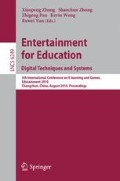Abstract
There are a variety of cognitive forms in network games, such as the problem-based cognition construction, the cognitive training based on AI challenge, the activity-based cognitive interaction, the task-based cognition retention, and the growth-based cognitive apprenticeship, etc. Meanwhile, based on the frequent interactions and distributed cognition among the players, there is an ecological field of learning, with large amount of information symbols, biggish interaction groups and free space for activities, etc. Its main functions are reflected in the situated tasks, the negotiated process, the collaborative environments, and the real-time feedback, etc.
Access this chapter
Tax calculation will be finalised at checkout
Purchases are for personal use only
Preview
Unable to display preview. Download preview PDF.
References
PopSoft Editorial: 2009 Annual Report on PC Gaming Industry in China. PopSoft, vol. 1, p. 103 (2010)
Hall, L., Woods, S., Sobral, D.: Designing empathic agents: Adults versus kids. In: Lester, J.C., Vicari, R.M., Paraguaçu, F. (eds.) ITS 2004. LNCS, vol. 3220, pp. 604–613. Springer, Heidelberg (2004)
Lakoff, G., Johnson, M.: Philosophy in the Flesh: The Embodied Mind and Its Challenge to Western Thought. Basic Books, New York (1999)
Hung, W., Chee Chua, L.: Social-Cultural Perspectives of R&D in Educational Technology. Edu. Tech. 40 (2000)
Paiva, A., Costa, M., Chaves, R., Piedade, M.: Sentoy: an affective sympathetic interface. International Journal of Human-Computer Studies 59(1), 227–235 (2003)
Hanf, Q., Mingyun, H., Leiting, C.: Survey of Synchronization Technology in Network Game Engine. Application Research of Computers (1), 14–17 (2007)
Cosmides, L.: The logic of social exchange: has natural selection shaped how humans reason? Studies with the Wason selection task. Cognition (31), 187–276 (1989)
Nardi, B., Harris, J.: Strangers and friends: Collaborative play in World of Warcraft. In: Proceedings of the Conference on Computer-supported Cooperative Work (forthcoming 2006)
Meyrowitz, J.: No Sense of Place: The Electronic Media on Social Behavior, vol. 11. Tsinghua Press, Beijing (2002)
Guomei, Z., Xiaolan, F.: Distributed Cognition: a New Cognition Perspective. Adv. Psychol. Sci. 2, 147–153 (2002)
Jianwei, Z.: A Model of Integrated Learning in the Information Era. Peking. U. Edu. Rev. (3), 92 (2003)
Rafaeli, S., Ariel, Y., Hayat, T.: Virtual Knowledge-Building Community & Users Incentives: The Wikipedia Case. Paper presented at the annual meeting of the International Communication Association (2007)
Jonassen, D.H., Peck, K., Wilson, B.G.: Learning With Technology: A Constructivist Perspective, p. 194. Merrill/Prentice-Hall, Columbus (1999)
Trilling, B., Hood, P.: Learning, Technology, and Education Reform in the Knowledge Age or “We are Wired, Webbed, and Windowed, Now What?”. Edu., Tech. 39, 5–18 (1999)
Steve, J.: Let the Games Begin: Gaming Technology and Entertainment Among College Students, vol. 6. Pew Internet & American Life Project, Washington (2003)
Author information
Authors and Affiliations
Editor information
Editors and Affiliations
Rights and permissions
Copyright information
© 2010 Springer-Verlag Berlin Heidelberg
About this paper
Cite this paper
Tao, K. (2010). Distributed Cognition and Ecological Field of Learning in Network Games. In: Zhang, X., Zhong, S., Pan, Z., Wong, K., Yun, R. (eds) Entertainment for Education. Digital Techniques and Systems. Edutainment 2010. Lecture Notes in Computer Science, vol 6249. Springer, Berlin, Heidelberg. https://doi.org/10.1007/978-3-642-14533-9_27
Download citation
DOI: https://doi.org/10.1007/978-3-642-14533-9_27
Publisher Name: Springer, Berlin, Heidelberg
Print ISBN: 978-3-642-14532-2
Online ISBN: 978-3-642-14533-9
eBook Packages: Computer ScienceComputer Science (R0)

